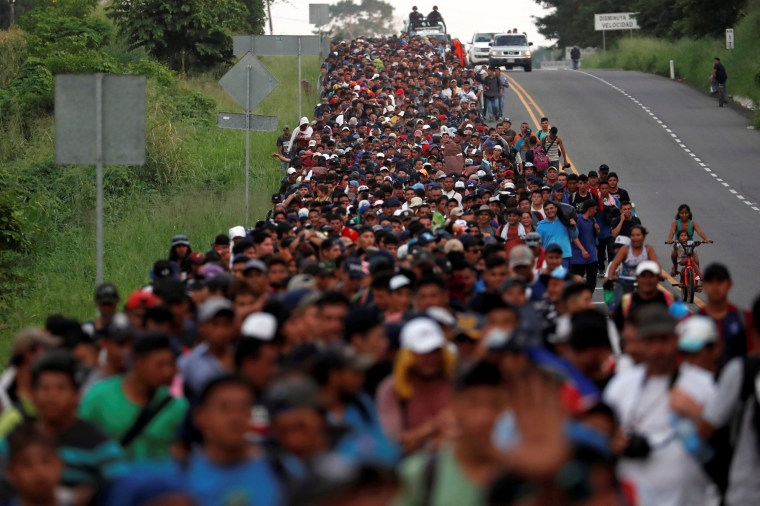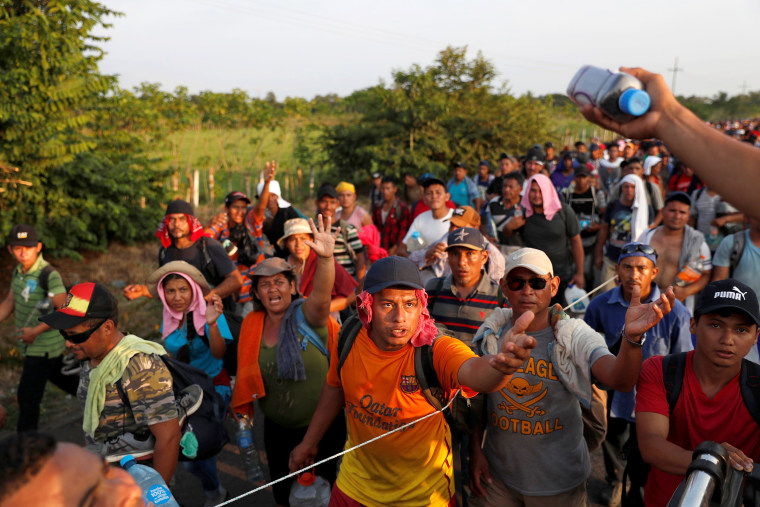HIDALGO, Texas — With the first of three Central American caravans of asylum seekers still more than 700 miles away from the U.S.-Mexico border, the military is beginning to fan out across southern Texas.
On Friday, soldiers reinforced the international bridge in Hidalgo, near McAllen, in the first wave of up to 15,000 troops that President Donald Trump has said will help secure the southern border. They are conducting drills and putting up chain-link fencing topped with barbed wire.
About 160 active-duty soldiers — mostly engineers and military police from various units — are now in the McAllen area, said U.S. Army Sgt. Maj. Faith Laughter.
In total, including members of the National Guard who have been at the border since April, Trump's military deployment to the border could cost more than $200 million, according to The Washington Post.
Hidalgo resident Josemaria Vasquez said she strongly opposes Trump's decision.
"There's better use of that money,” Vasquez said. “This is not an invasion."
McAllen resident Marianna Trevino Wright said she’s a Republican who voted for Trump, which she regrets.
"An enormous fraud is being perpetrated on the American people," she said, adding she believes Trump ordered troops to the border to energize Republican voters in the midterm elections Tuesday.
But some border patrol agents are grateful for help from the troops Trump has sent.
Chris Cabrera, border patrol agent and spokesman for the National Border Patrol Council, said agents like him have needed help "for some time." Still, he said that he feels lawmakers need to enact change to actually fix the issue of migrants crossing the border.
"You can put them shoulder to shoulder from Brownsville to San Diego," Cabrera said of the troops at the border. "All they got to do is put one foot on land and say I need asylum and we're still in the same position."
Cabrera said that although the troops cannot actually apprehend undocumented immigrants, they will act as extra eyes and ears for Border Patrol.

But for now, it's a waiting game — Cabrera said there's not a set timeline on when the caravan will arrive but said that he sees a caravan-sized number of migrants come through the McAllen area each week. He added that Border Patrol will still continue to operate as it has with or without extra support.
"As far as border patrol agents, I think we're going to continue doing what we do," Cabrera said. "Obviously if we can get some more manpower, that'll help out but we are going to continue to operate like we do because we're used to doing more with less."
Estimates of the sizes of the three caravans making their way to the border vary widely. But according to Mexican and Salvadorean officials, about 8,000 people are making their way toward the United States.
Many in the caravans are women and children who say they are fleeing rampant gang violence in Central America. But the U.S. Department of Homeland Security issued a statement Thursday that said about half are single men and at least 270 have criminal histories. It is not clear how they made that determination or how they arrived at that number.
On Friday, the governor of the Mexican state of Veracruz, Miguel Angel Yunes, said that his government would provide 100 buses to transport the migrants to Mexico City or “any other place they want” as early as Saturday.
However, hours later, he suddenly pulled the offer, saying the migrants should not head to Mexico City because of ongoing water maintenance there, which was expected to leave millions without water for several days. The maintenance has been expected for weeks.

Instead, Yunes offered to take the migrants to another city in Veracruz until the water issue in Mexico City was resolved.
“I want to make an offer to the migrants that while this problem is being resolved they accept my invitation to go to a city in Veracruz” that has the conditions to host them, he said.
In sending troops to the border, President Trump told the military that if they face rock-throwing migrants, they should react as though the rocks were "rifles" — a statement he later walked back.
"It is pure ignorance for him to think like that," said Marta Cuellos, a 40-year-old from Tegucigalpa, the Honduran capital. "A rock is not the same as a rifle."
Most of those traveling with the caravans have been peaceful and migrants traveling through the southern state of Oaxaca on Friday said they are not looking for trouble.
"We are not killers," said Stephany Lopez, 21, who traveld from El Salvador. "We just want to work for a few years, and after that he can deport us if he wants."
Lopez noted that the president's mother, who was born in Scotland, was an immigrant.
"He should think of us as equals. Immigrants have built that country," she said.
On the U.S. side of the border, in southern Texas, reaction to the troop deployment was mixed.
“We don't need the military down here, said Felix Rodriguez, a Vietnam veteran. “Our men and women in uniform are being used unwisely.”
Rusty Monsees, who lives in the border town of Brownsville, said he constantly sees immigrants crossing the Rio Grande onto his property.
“If I was in his shoes, I’d bring every troop I can find,” Monsees said of Trump.
When asked what he would say to critics who argue the deployment is a waste of taxpayer money, he responded: "They don't live down here.”


